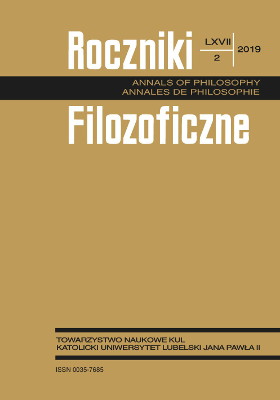Ewaluacyjne i egzystencjalne aspekty trafu moralnego
Abstrakt
Fenomen szczęścia stanowi problem dla etyki z dwóch powodów. Po pierwsze, utrudnia sformułowanie jednorodnych sądów moralnych dla dwóch lub więcej działań, które wydają się do siebie podobne w każdym moralnie istotnym aspekcie, z wyjątkiem niektórych udanych lub niefortunnych zdarzeń, które mają miejsce w jednym przypadku, a w drugim nie. Wystąpienie tych zdarzeń nie było pod kontrolą żadnego z agentów, ale dla zewnętrznych obserwatorów wydaje się być podstawą bardziej rygorystycznego lub bardziej tolerancyjnego osądu moralnego w jednym przypadku, a w drugim nie. Po drugie, szczęście może wpłynąć na nasze poczucie sensu życia poprzez sukces lub porażkę naszych ważnych egzystencjalnie projektów życiowych. Fakt ten sugeruje konieczność moralnie dopuszczalnych warunków polegających na szczęściu w formułowaniu i realizacji własnego projektu życiowego. W niniejszym artykule przedstawiam możliwości zastosowania głównych poglądów na szczęście do rozwiązania powyższych problemów.
Bibliografia
Ambegaokar, Vinay. 1996. Reasoning About Luck: Probability and Its Uses in Physics. Cambridge: Cambridge University Press.
Bewersdorff, Jörg. 2005. Luck, Logic, and White Lies: The Mathematics of Games. Wellesley, Mass.: A. K. Peters.
Coffman, E.J. 2015. Luck: Its Nature and Significance for Human Knowledge and Agency. Houndmills, Basingstoke, Hampshire, New York, NY: Palgrave Macmillan.
Dias, Fernando M.V., Hugo A. Cano-Prais, Sérgio Kehdy i Antônio L. Teixeira, „A Pathological Gambler by Dostoyevsky”. Revista de Psiquiatria do Rio Grande do Sul 30, 2: 236–240. DOI: 10.1590/S0101-81082008000400013.
Domsky, Darren. 2004. “There is no door: Finally Solving the Problem of Moral Luck”. The Journal of Philosophy 101, 9: 445–464. DOI: 10.5840/jphil2004101930.
Dostojewski, Fiodor. 1992 [1867]. Gracz. Przełożył Władysław Broniewski. Warszawa: Wydawnictwo Puls.
Driver, Julia. 2013. „Luck and Fortune in Moral Evaluation”. W: Contrastivism in Philosophy. Red. Martijn Blaauw, 154–173. London: Routledge.
Fletcher, George P. 1996. Basic Concepts of Legal Thought. New York, Oxford: Oxford University Press.
Frankfurt, Harry. 1969. „Alternate Possibilities and Moral Responsibility”. The Journal of Philosophy 66, 23: 829-839.
Hales, Steven D., i Jennifer A. Johnson. 2015. Luck Attribtutions and Cognitive Bias. W: The Philosophy of Luck, red. Duncan Pritchard i Lee John Whittington, 59–77. Chichester, West Sussex, UK: Wiley Blackwell.
Juzaszek, Maciej. 2014. „Między trafem moralnym [moral luck] a trafem prawnym [legal luck]”. Diametros 41: 56-76. DOI: 10.13153/diam.41.2014.577.
Lackey, Jennifer. 2008. „What Luck Is Not”. Australasian Journal of Philosophy 86, 2: 255–67. DOI: 10.1080/00048400801886207.
Latus, Andrew. 2003. „Constitutive Luck”. Metaphilosophy 34, 4: 460–75. DOI: 10.1111/1467-9973.00285.
Levy, Neil. 2011. Hard Luck: How Luck Undermines Free Will and Moral Responsibility. Oxford: Oxford University Press.
Mann, Karl, Mira Fauth‐Bühler, Susumu Higuchi, Marc N. Potenza i John B. Saunders. 2016. „Pathological Gambling: A Behavioral Addiction.” World Psychiatry 15: 297–298.
Nagel, Thomas. 1993. Moral Luck. W: Moral Luck, red. Daniel Statman, 57–71. Albany: State University of New York Press.
Pritchard, Duncan. 2005. Epistemic Luck. Oxford: Oxford University Press.
Rescher, Nicholas. 1995. Luck: The Brilliant Randomness of Everyday Life. New York: Farrar, Straus and Giroux.
Riggs, Wayne. 2009. Luck, Knowledge, and Control. W: Epistemic Value, red. Adrian Haddock, Alan Millar i Duncan Pritchard, 204–221. Oxford, New York: Oxford University Press.
Singer, Peter. 2016. The Most Good You Can Do: How Effective Altruism Is Changing Ideas about Living Ethically. Melbourne, Vic.: The Text Publishing Company.
Steglich-Petersen, Asbjørn. 2010. „Luck as an Epistemic Notion”. Synthese 176, 3: 361–77. DOI: 10.1007/s11229-009-9569-x.
Stoutenburg, Gregory. 2015. „The Epistemic Analysis of Luck”. Episteme 12, 3: 319–334. DOI: https://doi.org/10.1017/epi.2014.35.
Teigen, Karl H. 2005. „When a Small Difference Makes a Large Difference: Counterfactual Thinking and Luck”. W: The Psychology of Counterfactual Thinking, red. David R. Mandel, Denis J. Hilton i Patrizia Catellani, 129–146. London: Routledge.
Wallace, R. Jay. 2012. „Justification, Regret and Moral Complaint: Looking Forward and Looking Backward on (and in) Human Life”. W: Luck, Value and Commitment: themes from the ethics of Bernard Williams, red. Ulrike Heuer i Gerald Lang, 163–192. Oxford: Oxford University Press.
Whittington, Lee John. 2015. „Getting Moral Luck Right”. W: The Philosophy of Luck, red. Duncan Pritchard i Lee John Whittington, 205–218. Chichester, West Sussex, UK: Wiley Blackwell.
Williams, Bernard. 1993. „Moral Luck”, W: Moral Luck: Philosophical Papers, red. Bernard Williams, 20–39. Cambridge: Cambridge University Press.
Copyright (c) 2019 Roczniki Filozoficzne

Utwór dostępny jest na licencji Creative Commons Uznanie autorstwa – Użycie niekomercyjne – Bez utworów zależnych 4.0 Międzynarodowe.





